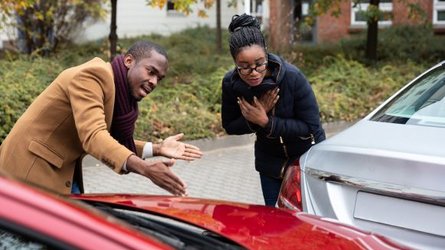Accidents happen. When they do, you’ll need to think quickly to remain as safe as you can. If you’re reading about what to do in a car accident proactively so that you’ll be prepared if you get into an accident, that’s smart.
If you’ve recently been involved in an accident and you’re wondering if you forgot anything on your mental “what to do when you get into a car accident list,” don’t panic. An attorney can help you sort out anything that may not have gone according to plan. If you just got hit and you need to know what to do right now, here are nine steps to help you through the post-accident process.
In this article: After impact, your first instinct might have been to grab your phone to search for “what to do in a car accident. ” If so, you’re in fight mode, not flight or freeze mode, so your body’s stress response is headed in the right direction for this situation. Don’t flee the scene and don’t just sit in your car.
Now is the time to take action. Keep your eyes open and your mind alert so that you don’t risk greater injury or property damage while taking your next steps. If you can safely move your vehicle to the side of whatever road you’re on, do so.
This will help to prevent other cars from smashing into your damaged vehicle. Once you’ve moved it, turn off your engine to minimize fire risk. If you can’t move your car but you can safely move yourself and anyone else in your car out of harm’s way, do so now.
Is anyone visibly hurt? Are you obviously hurt? If so, your main priority is to attend to the injured . Every step after step four on this list can wait until everyone is medically stable. There’s nothing more important than the physical well-being of everyone involved in the crash.
If anyone involved in the accident requires emergency medical attention, call 9-1-1 immediately. If no injuries are visible but the impact was hard enough that someone may have sustained internal injuries, also call 9-1-1. If the accident was minor and no one was injured, call the police so that they can begin preparing an accident report before evidence becomes compromised at the scene.
If for any reason you’re uncomfortable in the presence of law enforcement, contact a personal injury attorney to meet you and the police at the accident scene. Until now, you’ve taken steps to safeguard your physical well-being. If you’re not seriously injured, you can now take a few actions at the scene that may help you protect your legal rights and options down the road.
If you’re in a position to safely do so, collect the following evidence: If you don’t think you need to go to the emergency room, get checked out by a physician at an urgent care facility as soon as you can. Keep records of any unusual symptoms or injuries you’ve sustained and the name and contact information of any providers involved in your diagnosis and treatment. If you’re prescribed medication or told to engage in any kind of follow-up care, obey these directions to the letter.
Failure to do so could compromise the strength of any personal injury claim that you might file later on. As soon as you’re medically stable and can do so safely, take a few moments to write down or record your impressions of the accident. The brain is impacted in specific ways by trauma .
Your memories and impressions of your crash will almost certainly shift over time. Having a record of your impressions from the moments before the crash, to the impact, to your concerns about what to do in a car accident may serve as an important reference for your healing and for your attorney in the coming days, weeks, and months. According to one U.
S. Centers for Disease Control and Prevention report, 2. 1 million emergency room visits were made across the U.
S. due to car accident injuries over a single one-year period. If you’ve been hurt and/or your car has sustained significant damage, you may be entitled to significant compensation.
Once you’ve been medically cleared, it’s time to shift your focus from what to do in a car accident to steps you should take in its aftermath to protect your rights and recover compensation. Now that you have a better idea of what to do in a car accident, it’s time to ask an attorney what you should do next. Learn about your rights and options under the law by scheduling a free case evaluation with a personal injury lawyer in your area.
Legal Disclaimer: This article contains general legal information but does not constitute professional legal advice for your particular situation and should not be interpreted as creating an attorney-client relationship. If you have legal questions, you should seek the advice of an attorney licensed in your jurisdiction. Learn more about car accidents and settlements.
.
From: motor1
URL: https://www.motor1.com/reviews/592437/after-car-accident-nine-steps/



